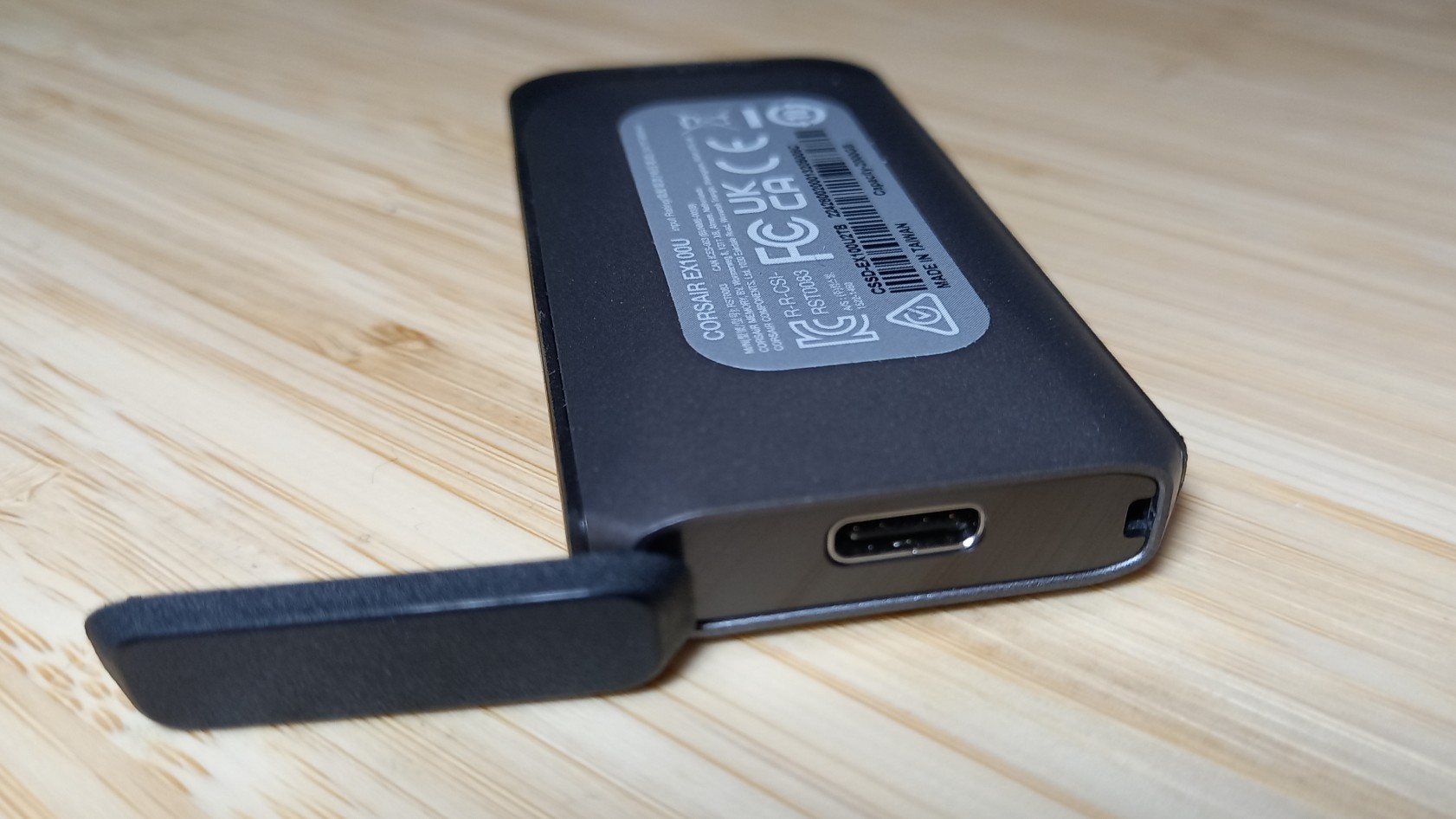Our Verdict
If you're looking for portability, you'll love this tiny SSD: it could hardly be smaller or lighter. Only slightly bigger than a USB stick, it can hold 2TB of files, and if you have a USB-C slot on your computer, it will transfer your data at very fast speeds. A lead's included for USB-A devices too, and overall, this is a competitively priced SSD. The only downside is the potential to lose or misplace it, because it really is very small.
For
- Compact size
- Ultralight
- Fast transfer speeds
- Good value overall
Against
- Easily to lose
- No security features
- No onboard backup tool
Why you can trust Creative Bloq
Portable solid-state drives (SSDs) like the Corsair EX100U are a great place to store all your images, videos and other files, and free up the space on your laptop (so it runs faster). They allow you to move large files to and from storage quickly, and they're increasingly small, light and portable. And this Corsair drive is the tiniest we've seen to date.
This diminutive device is about half the size of a credit card and weighs virtually nothing, and yet it can store up to 4TB of stuff. That sounded very impressive, so I was keen to get my hands on one and find out what it's like to use in practice, and where it stacks up against the best external hard drives. Read on and I'll explain what I learned from testing and extensively using the 2TB version of the drive over a period of several weeks.
Corsair EX100U review: Design
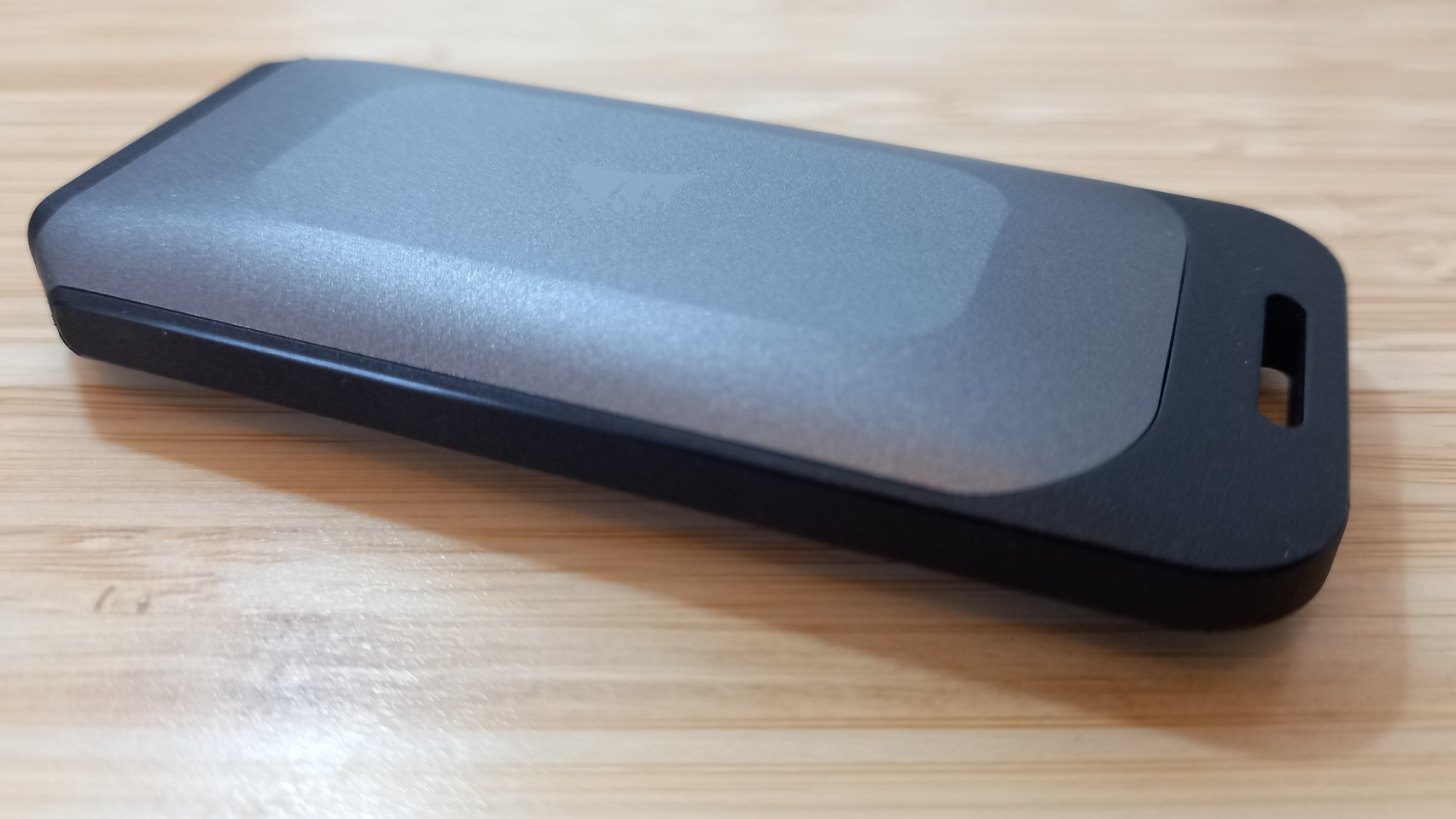
The Corsair EX100U is a small flat rectangle made from frosted aluminium alloy. There's a Corsair logo printed on the top and an information sticker on the back. The name, 'EX100U', is printed on the side, which is handy if you have a lot of tech in your house and you can't remember what anything is (a problem tech journalists obviously suffer from more than most).
At one end there's a little handle, presumably for fastening onto a key ring or similar. At the other end is a cap, which you remove to expose the USB-C port. It doesn't detach completely, which is good because otherwise it would easily get lost. When you're not using the drive, you can then return the cap to stop dust and other nasties getting into it.
As well as the standard safety information leaflet, the Corsair EX100U comes with two cables: a USB-C to USB-C, and USB-C to USB-A. If you have a USB-C slot in your laptop, you'll want to use the former. If you have an older laptop with only USB-A ports, you can use the latter, although you won't get the top data transfer speeds.
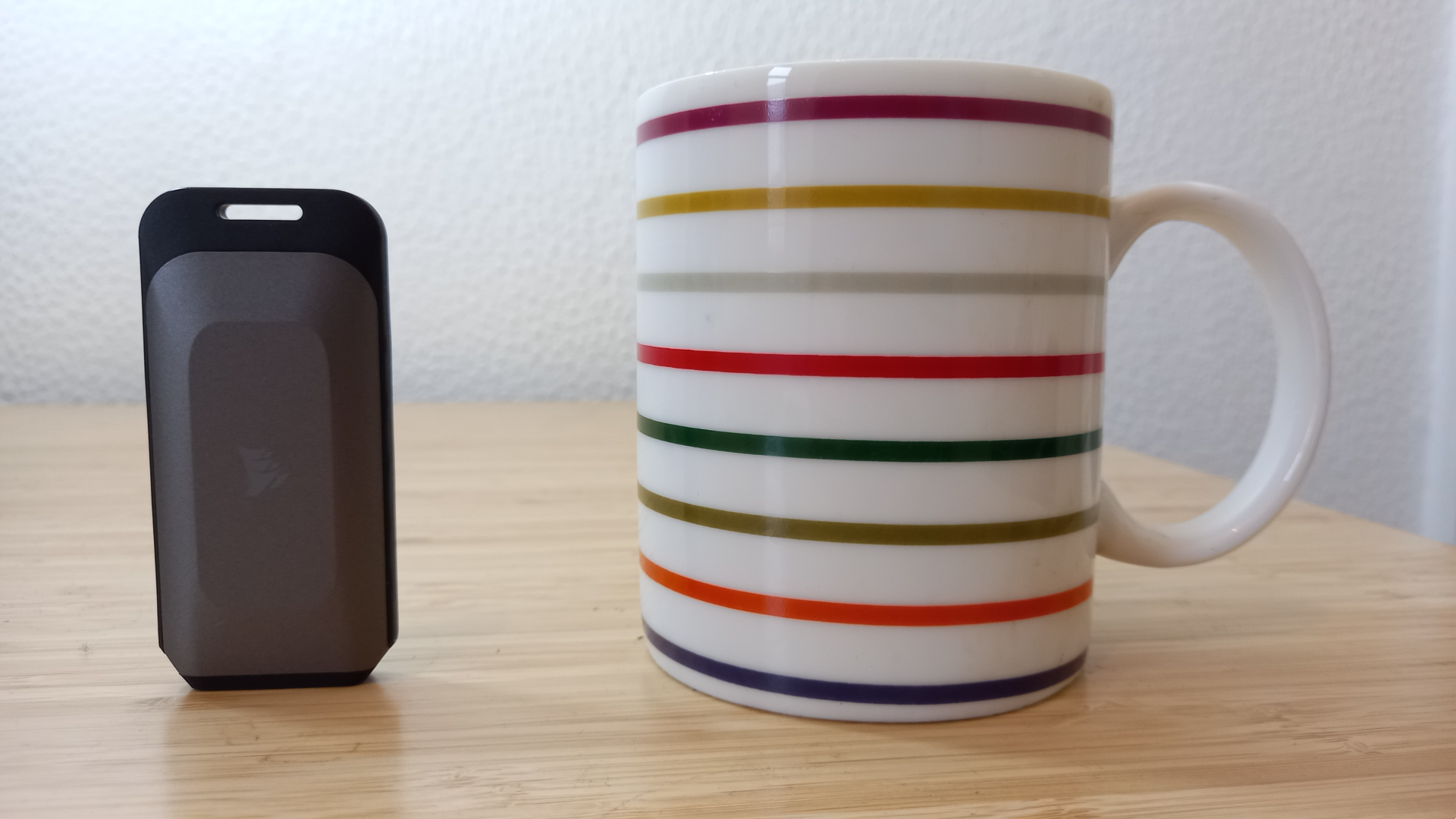
To use it, you just need to plug in the appropriate lead and connect it to your PC, laptop or gaming console. It doesn't require a separate power source.
This device is seriously light, at just 20g/0.7 oz, and tiny, at just 79mm (1.44 inches) long, 37mm (3.12 inches) wide and 11m (0.43 inches) thick. That makes it super-portable, fitting easily into any pocket, purse or handbag. It's barely bigger than your average USB stick.
Sign up to Creative Bloq's daily newsletter, which brings you the latest news and inspiration from the worlds of art, design and technology.
On the downside, that does make it potentially easy to lose. If you're scatty like me, you'll also worry about misplacing it around the house: it could easily fall down the crease in a sofa for example, and given its not-very-distinctive colours, it's not even easy to spot in plain sight. So personally, I felt the need to add a colourful sticker on both sides, to make it more visible.
Corsair EX100U review: Features
Unlike other external hard drives and SSDs, the Corsair EX100U does not have any features to speak of. There are no security protections, for example, which seems like a missed opportunity given how easy it is to lose. There's no onboard backup software, either.
If these things are important to you, you can always download third-party software, of course. But it would have been nice to have some of these ready out-of-the-box.
Corsair EX100U review: Performance
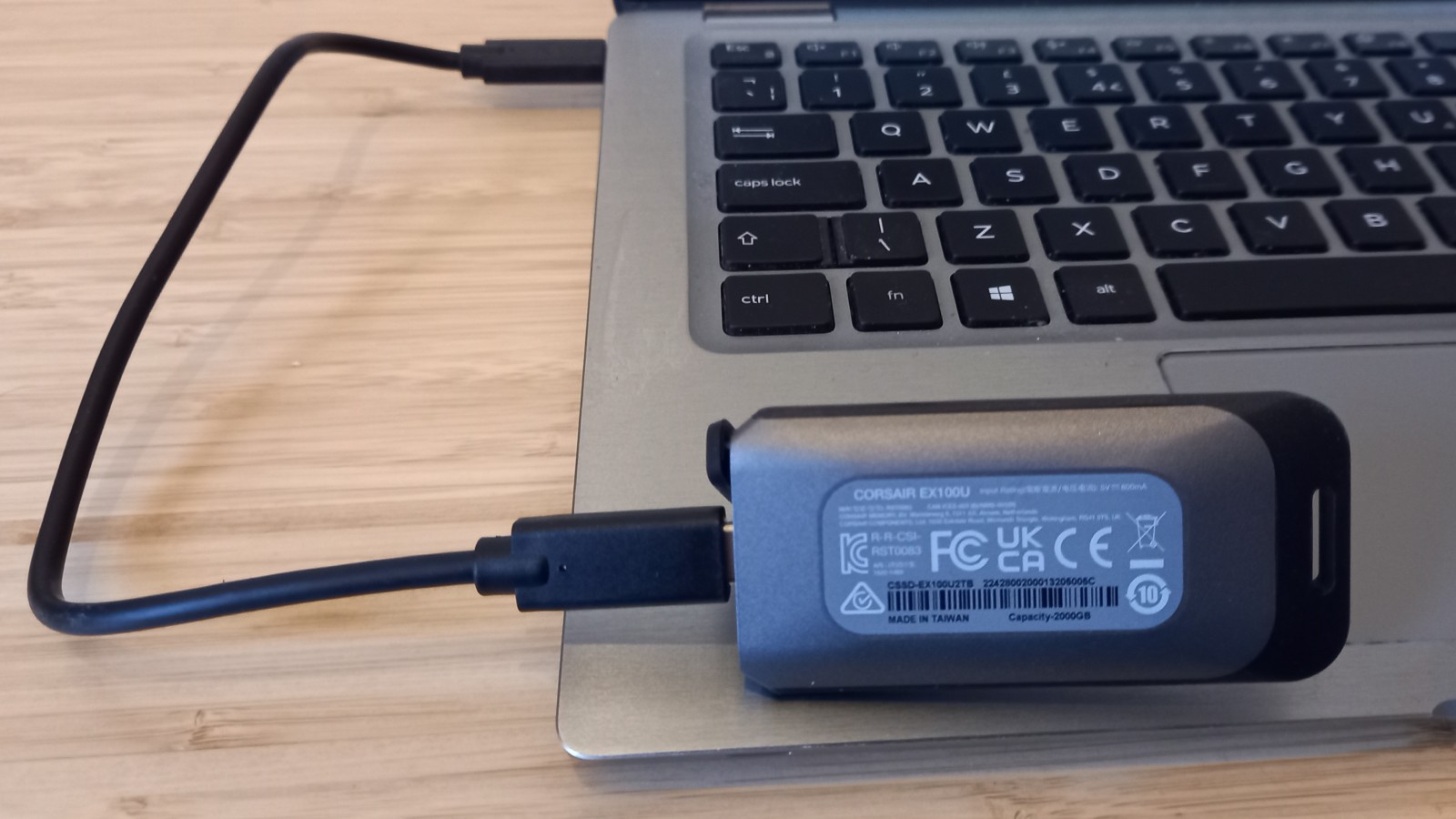
The Corsair EX100U features a USB 3.2 Gen2 x2 interface for high bandwidth transfers, and claims read and write speeds up to 1,600MB/s and 1,500MB/s respectively. And in our benchmark tests, using the Origin EVO17-S (2022), we achieved speeds that exceeded this, with CrystalDiskMark reporting a read speed of 1770.13 MB/s and write speed of 1601.03 MB/s.
CrystalDiskMark Read speed: 1770.13 MB/s
CrystalDiskMark Write speed: 1601.03 MB/s
AS SSD Read speed: 1684.29 MB/s
AS SSD Write speed: 1569.76 MB/s
ATTO Read speed: 1,634.32 MB/s
ATTO Write speed: 1,523.99 MB/s
That's very fast. By way of comparison, in our recent tests of the (admittedly more stylish) Seagate Spider-man FireCuda hard drive we got a read speed of 136.44 MB/s and write speed of 136.12 MB/s. If you're mainly moving small files like text documents, that's pretty irrelevant: they'll copy across instantly on both devices. But if you're transferring a lot of large assets such as 4K and 8K videos, you'll definitely notice the difference in speed.
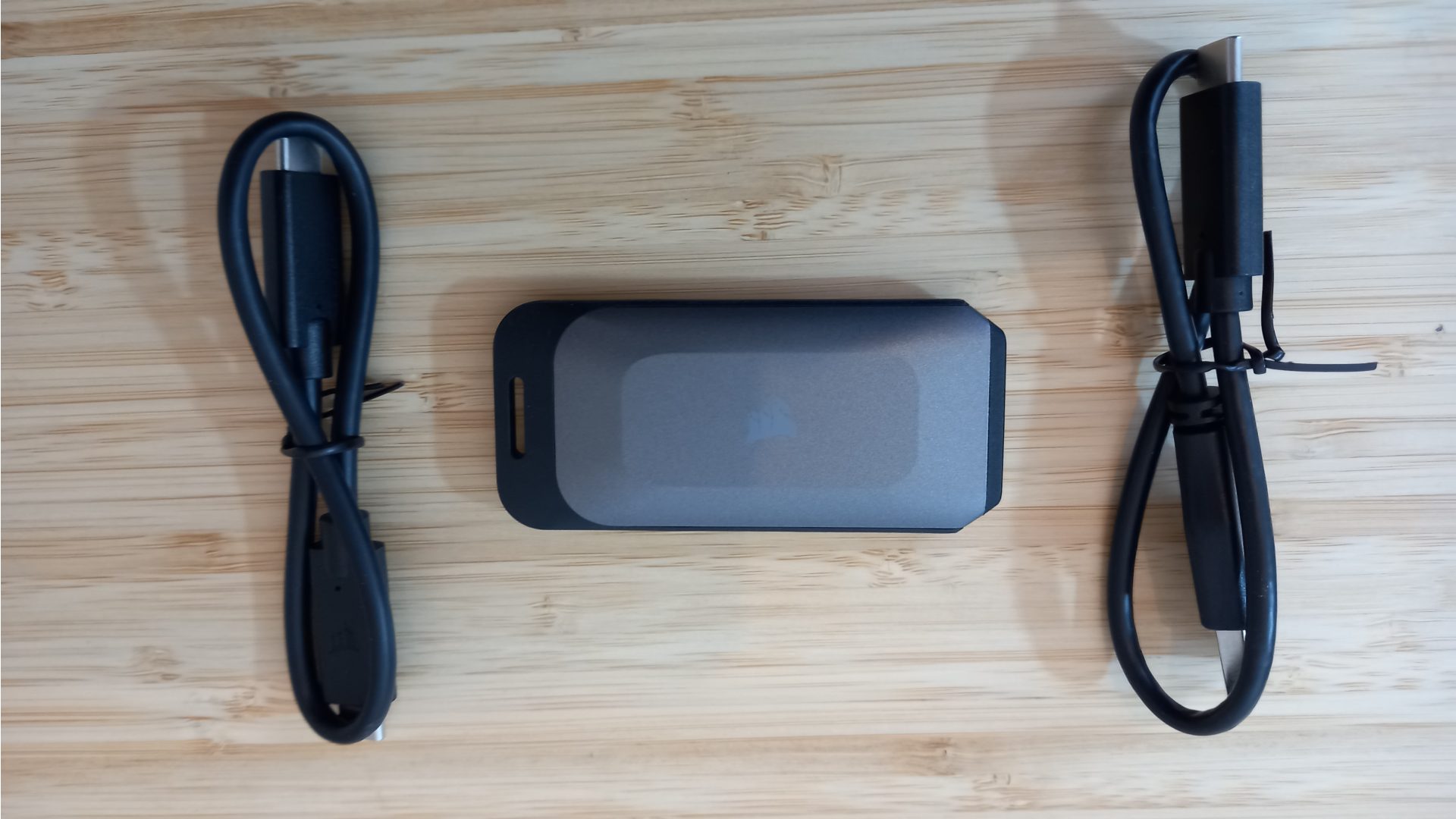
What that means in human terms is that whatever we threw at the Corsair EX100U, it copied over in almost no time at all. For example, I transferred a 16GB video in a smidge over 30 seconds. Plus it's also worth noting that it remained absolutely silent in use, however much work it happened to be doing. So in terms of performance, we couldn't really have asked for more.
Corsair EX100U review: Price
The 2TB version of the Corsair EX100U costs $184.99 / £204.99 / AU$324.99. There's also a 1TB version for $102.99 / £114.99 / AU$186.99 and a 4TB version for $464.99 / £514.99/ AU$809.99.
Corsair EX100U review: Should you buy it?
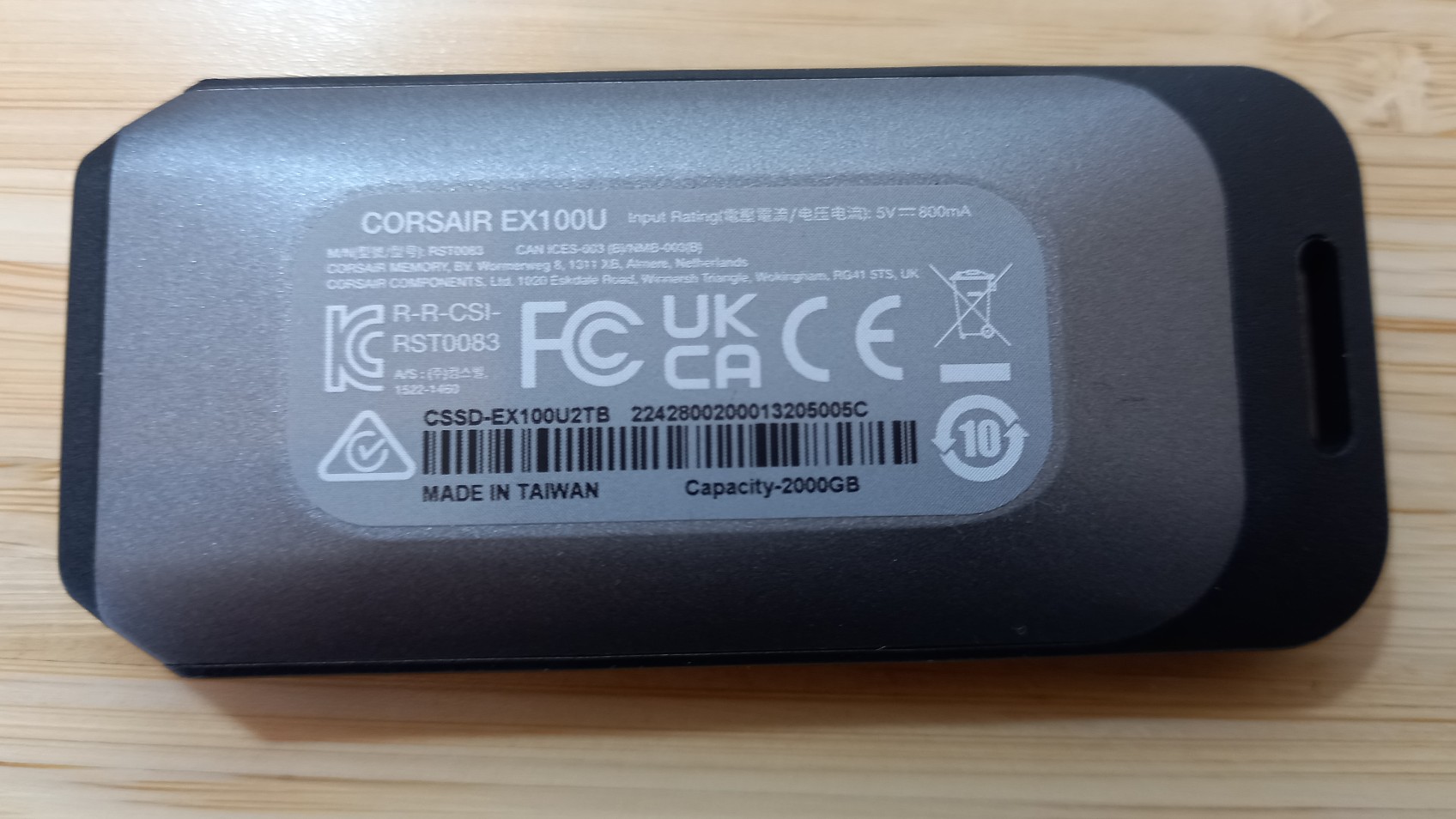
The Corsair EX100U 2TB is pretty good value for an SSD. For example, at the time of writing the 2TB version of the Samsung T7 Touch Portable SSD on Amazon costs $329.99 / £241.19 / AU$499.99. And that device is larger and offers less impressive read/write speeds of up to 1,050 and 1,000 MB/sec.
Admittedly, many people may actually prefer something a little chunkier than the Corsair EX100U, which is so light and tiny that it's easy to lose. And if you're using a computer with USB-A only, you won't get the stellar speeds.
However, if you're generally a careful and organised person, then the EX100U has a lot to offer. Especially if you're on the move a lot with your computer, or just like to keep tech clutter down to a minimum in your home. Because, just to hammer home the point one more time, this really is very small.
out of 10
If you're looking for portability, you'll love this tiny SSD: it could hardly be smaller or lighter. Only slightly bigger than a USB stick, it can hold 2TB of files, and if you have a USB-C slot on your computer, it will transfer your data at very fast speeds. A lead's included for USB-A devices too, and overall, this is a competitively priced SSD. The only downside is the potential to lose or misplace it, because it really is very small.

Tom May is an award-winning journalist specialising in art, design, photography and technology. His latest book, The 50 Greatest Designers (Arcturus Publishing), was published this June. He's also author of Great TED Talks: Creativity (Pavilion Books). Tom was previously editor of Professional Photography magazine, associate editor at Creative Bloq, and deputy editor at net magazine.
